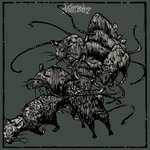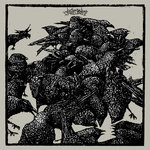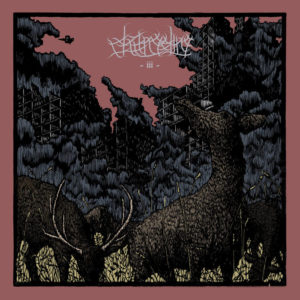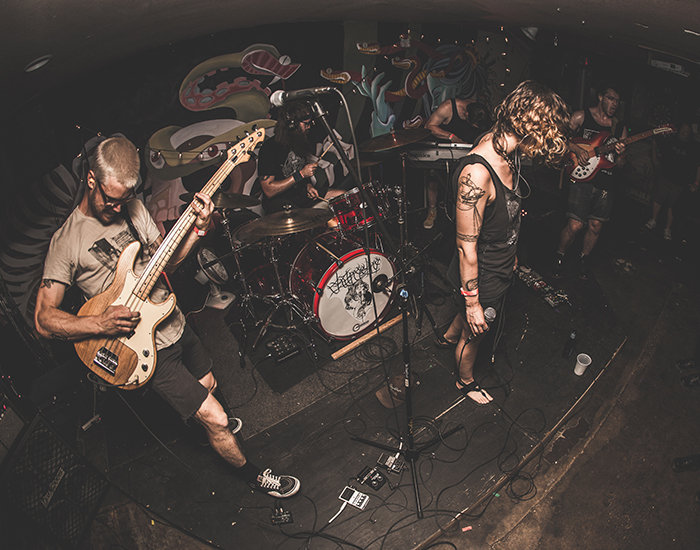Band – Changeling
Album – I/II/III
Country of Origin – USA
Genre – Black Metal
Release Date – I (September 7, 2017), II (June 12, 2018), III (May 8, 2020)
Label – Independent Releases
Author – Hayduke X

Changeling jumped onto the scene in 2017 in the hot bed that is Minneapolis, Minnesota. In the same year as their formation, the project released I, their initial statement of intent. The album starts out like the end of the 3rd Precinct in that city, a raging fire of political will. As the conflagration continues to burn, the album evolves and what started out as a very satisfying rager begins to take on some interesting nuances. The fourth track No Such Stillness has some riffing that strikes me as having some influence from South American traditional music, perhaps bolero or something (I’m kind of an idiot at nailing down musical influences, so feel free to correct me), a theme that makes periodic appearances throughout the rest of the album.
I also noticed a couple of other evolutions. One is some intriguing rhythmic work, especially in the drumming. Unrelenting blasting began to bring some other elements into the mix, noticeably some syncopation and offbeat drumming (not off rhythm…just off beat). The other is the guitar tones, which are noticeably brighter and cleaner than a lot of black metal. Once I clued into this last, I realized that it had been a feature all the way along. It just took me some time to realize it. Perhaps this is because the brightness of the tones are balanced by intriguing dissonance and strangeness in the riffing throughout the album.
It’s incredible to me how complete the quintet already is on this album. It’s as if Changeling were born fully formed. Though there are areas of growth I can hear on the album (there are a couple of sections that drag a bit to me), they are few and far between. I is one of the strongest debuts I’ve heard in a long time. Add to this musical strength the fact that the band is openly anti-fascist from day one, and you have a winning combination.

If I is the fire of a police precinct burning to the ground, then II is the raging inferno of the entire city. The album is ANGRY!!! After the clean, quiet, acoustic introduction to the first track, which sounds like it has some guest violin to me, the spark ignites the tinder, and the conflagration roars until the quiet returns (sort of) at the end of the final track. Changeling have hunkered down on this release. It’s ugly, purposeful, and visceral. Some of the cleaner guitar tone can still be heard through the flames in part, but as a whole, the tones are darker and more raw.
While I clocks in at just over thirty minutes across nine tracks (seven really, as two are very short interludes), II uses only four tracks to cover essentially the same length of time. Before listening, my assumption was that the tracks must be more sprawling. I was incorrect. The tracks are musically very tightly wound and quite oppressive. There is very little breathing between the riffs. It’s as if a vortex of raw emotion encircles the listener throughout each spin.
II is blunt force trauma to the dark, but ultimately more hopeful I. This album has a slower burn, though there is plenty of speed to be found in both blasting and riffing. There is an overwhelming sense of inevitability to II that wasn’t there on the prior album. A more difficult listen, it is also ultimately more rewarding if you give it the time it deserves. It will seep into your pores and become a part of you, filling you with righteous anger, which can hopefully be put to good purpose.
One last comment, as promised, about the way the final track ends. The band teases a return to the quiet, acoustic introduction, as if to come full circle, hits the ugly obliteration button again for a few moments, and then ends with the quieter notes, but overlaid with nasty feedback. To me, this is suggestive of a lack of hope. There is no quit in the hopelessness though, as the entire album feels like a fist raised around a book of matches, with a can of gas in the other hand.

On their most recent release, Changeling find a middle ground between the prior two. While I was slightly prettier (I use that word with a little trepidation…there’s plenty of nasty there too) and II was a combined brick and molotov cocktail, III is perhaps the embodiment of an activist and comrade, ready for action, but a realist regarding the hope for actual substantive change. The album is the warrior who, battered and bruised, gets back up to walk back into the line of cops, armored like soldiers in a war zone.
III is another slow burn, in many ways a closer kindred to II. Yet the album also has some flourishes that call to mind the debut, moments of beauty amidst the ugliness, though certainly a forlorn and mournful beauty. Overall, this album has the most melancholy sound, which feels like an acknowledgement of the likely inevitabilities of humanity, society, and the earth without drastic (and unlikely) change.
All told, I think I would currently list the three releases in order of preference as follows: II, III, I, but none of them are that far off from each other, and all are excellent. The second release is my favorite because it is such an angry, out of control fire, which perhaps suits my mood best at the moment. The latest is very close to this, as it is a more mature, more nuanced version of the same, though also more controlled (therefore dropping it down slightly). The debut stands tall as a strong album in it’s own right, but ultimately, I’m not sure the band had quite found their voice yet.
Interview
Hayduke X: To start, can you all introduce yourselves and your role in the band?
Eric: Eric-drums
Max: Max – keys
Jaxon: Jaxon – Guitar
M.A.S.: M.A.S. – vocals
David: David – bass / backup vox
HX: Can you fill me in a bit on the formation and history of Changeling?
David: Sure, I can jump in. Jaxon and I started playing music together back in 2016. We were both interested in writing black metal. From there, Max, Eric, and M.A.S. joined one by one. We all knew each other beforehand, but had never played in projects together.
HX: Do you all have some background in other bands?
Eric: Yeah, I’ve played in a variety of metal/punk/noise bands in Minneapolis over the last 15 years
M.A.S.: I’ve played in several of bands since high school (punk, hardcore, and metal primarily), though not doing vocals.
HX: Is this your first time doing vocals?
M.A.S.: Yes.
HX: That’s really impressive. You sound like a veteran.
M.A.S.: Aw, thanks.
David: I had been in a few bands before. I believe I was concurrently in the band Without (doomgaze?? I’ll have to check the Bandcamp for their genre tags..heh) at the time that Changeling was in its infancy, but have since left.
Jaxon: Yeah, Changeling was my first black metal project. I played in a couple other punk bands as well, mostly playing guitar, but also played drums and bass in a couple projects.
Max: I played keys in several Minneapolis punk/doom metal bands over the last fifteen years as well. Toil, Bellow and Crone to name a few.
HX: I don’t see a lot of black metal history for any of your, at least in terms of playing. Why a black metal band?
Eric: There’s a level of intensity and raw emotion to good black metal that I find really appealing and unique.
David: I think we all had various reasons for being drawn to black metal. In particular, I love the tension in the music. And I think black metal lends itself to to write all sorts of melodies and rhythms, so there’s a lot of freedom in that.
Jaxon: For me I was really drawn to the technique, tremolo picking and really fast beats. I also studied classical music in school and with black metal there’s a lot of room to explore those types of harmony and counterpoint.
Max: For me, I’ve always been attracted to the more ambient styles of metal, and until this band, had normally explored the sludgy/doom end of ambient metal, but am equally attracted to black metal, because it kind of has the same emotional feel.
HX: What are some of the black metal bands that you listen to that have inspired you to make your own?
Eric: Yellow Eyes, Anicon, Weakling, Ragana, a lot of others.
HX: Eric, as a side note, I had the pleasure of seeing Ragana live in a basement with about fifteen other people. Definitely one of my favorite live shows of all time.
Eric: Hell yeah! Such a good band, one of my old bands opened for them here years ago at a warehouse.
HX: Sick!
Jaxon: That show was sick!
HX: I’m sure you are all aware that black metal, as a larger genre, has a problem with right wing politics, notably with openly NSBM bands. You’ve done the opposite, stating that you are RABM on your Bandcamp. Can you talk about this a bit?
Eric: Yeah- one of the reasons a lot of us hadn’t played black metal before was exactly that, and finding a group of like-minded anarchist/far left folks to create music with was a pretty essential component of this project existing.
M.A.S.: We also wanted to add to the anti-facist voices in the genre, and try to help create a space that is welcoming to everyone.
Eric: Except fascists.
Max: I had actually been wary of the genre for a long time, because of this reason, but once I started seeing the various communities of RABM and explicitly non-fash BM in the US, (Cascadian scene, Gilead media, Panopticon, etc) I thought it was a more worthwhile genre to engage in.
HX: That makes sense and thanks for jumping into the struggle. Are your lyrical themes leftist in nature?
M.A.S.: Yeah, themes have been focused around trauma (systemic, inherited and individual), oppression,, and the effects that has on individuals and communities.
HX: Is that across all three albums, or does each carry it’s own theme?
M.A.S.: There are definitely some of those elements in all of the albums, but they have their separate sub-themes. The third album centers around a dystopian future that amplifies some of the systemic oppression and abuse that exists in our society and the way our beliefs can cloud our ability to see those things clearly.
HX: I can see that. The music fits those themes well.
Eric: Thanks!
HX: If we can step out to a bit of a bigger picture, Minneapolis was in the news a lot earlier this year with the protests around the murder of George Floyd. What can you tell me about being in the city at that time? What are things like there now?
M.A.S.: I would say that it was an inspiring and necessary response to a continued history of systemic oppression, injustice, police brutality, and murder.
Eric: Minneapolis/Twin Cities has a long history of segregation through redlining and highway construction and other historical means, as well as ongoing gentrification in a lot of historically Black/Indigenous/POC neighborhoods. And the police here (/everywhere) have a long history of murder, abuse, and prioritizing the protection of property over the protection of life. The outpouring of rage and destruction of property is a pretty obvious response to a brutal murder, especially during a pandemic during which the government has largely failed in all of it’s supposed responsibilities.
Max: I haven’t been living in Minneapolis the last two years, but I came back for a few weeks shortly after the uprising started and it blew me away how much the people stepped up to self-organize all sorts of mutual aid projects that are still operating today, foodshares, tent encampments, etc. The police also basically stopped doing their jobs for a while, so people organized neighborhood watches and called each other for help instead of calling the cops.
Eric: Proving how unnecessary the cops are/have always been. While the cops try to fear-monger people into believing they are needed.
HX: Has that been effective? What has worked in regards to community support like that, which could be used to start to build a different model for community? Also, that’s really cool to hear. The defunding of MPD and removing them from schools were two substantive changes that I was so glad to see.
Jaxon: initially it felt like there was a lot of support for defunding the police and local politicians voicing support for this. However, recently it seems officials are back pedaling or delaying. which is really frustrating.
Eric: Mutual aid is a great model for replacing state services/functions, but it can be hard to sustain some projects when public focus and donations start to dry up a bit. But folks have been doing a lot of really rad work.
Max: A lot of the mainstream media has been focusing on rise in crime rates in the area of the uprising after the fact, but I grew up in this neighborhood and as a kid there was even more crime than today, but long prison sentences for offenders in the 90s and intense gentrification in the area has made people pretend like MPLS was always a perfect place, so it was just a matter of time before something like this happened in my opinion.
HX: That is frustrating. Interestingly, I don’t feel the word is getting out about those things. None of that is surprising though.
Eric: Yeah so the “defunding the MPD” thing was a majority of the city council making a non-binding public statement, and not actually a legislative solution as of yet. Which was/is super exciting to see people say, but I won’t believe it until I see it (and I see them trying to back out of it already).
Max: Not that this surge in violent crime is desirable, but it is just a natural outcome of a justice system that further impoverishes the communities it claims it is there to protect.
Jaxon: Yeah, there’s been a lot of push to change the narrative, to make defunding or abolishing police seem like it couldn’t work. A lot of that is coming from centrists and liberals as well as right wingers and the police.
HX: A big problem with that narrative (defunding doesn’t work) is that the alternatives haven’t been properly tried.
Eric: Yes! exactly.
M.A.S.: I think a lot of the plans that are being pushed right now are replacing one broken system with another. There is a big push to add in more social workers to police response, instead of actually abolishing the police. Unfortunately, social work has a history of being another arm of injustice against communities of color, especially BIPOC folks. Social work has done this from the very beginning, and continues to this day, including things such as the child protection system and the taking of Black and Indigenous children from homes, instead of providing resources. It is also a very white field, and needs a massive amount of its own re-working.
Max: I believe defunding or abolishing the police also has to go hand in hand with a full redistribution of wealth/means, otherwise there will just be private security doing their job. Fortunately, there are people actively organizing on many fronts, including organizing service sector unions, fighting for public housing and more.
Eric: Yes, there is a looming eviction crisis which is only going to make all of these other crises worse, as one example.
HX: I’ve thought for a long time that we (anarchists, leftists, etc) need to organize solutions to these issues in solidarity with our communities BEFORE actual substantive change can happen, or (as you are saying) basically the same system with a new paint job will just take place of the old. It’s good to see some of that happening there and maybe starting to reach a wider community, but also frustrating to see how much farther we still need to go.
Eric: One of the cool things to see has been a lot more people engaging with these ideas/mutual aid projects/radical politics in general, which it feels like is partially due to people having more time than usual due to being out of work during a pandemic. Which kind of illustrates many of capitalism’s methods of control. And I hope these are long term engagements, and not just a short term thing before people go back to work. I think a lot of folks are newly radicalized in a way that would be hard to undo, though.
HX: I would agree with that. That’s a topic I’ve been pondering blogging about, namely the way capitalism traps us.
Eric: yep yep
Max: Also the election cycle has a lot of people trapped right now.
HX: That’s a fact!
Eric: Truth. And there are a lot of people who want to “go back to normal” which obviously isn’t realistic, and certainly isn’t desirable.
HX: I’d like to narrow in on the music scene there. There’s been some upheaval with, if I’m understanding correctly, multiple members of the scene outed as predators or implicated as staying silent. From the outside, it seems like the ripples run pretty far. Is that accurate?
Eric: Yeah, there’s been a large-scale callout happening in the music and theater scenes here (broadly) and there’s been some prominent community members in the metal/punk scenes called out for both abuse and inaction around abuse. There’s also been some targeting of responsibility to be a voice placed on survivors that isn’t extended to all of the connected individuals (kinda vague, trying to stay away from naming people specifically).
Jaxon: it sucks to see shitty behavior perpetuated in the metal scene, a scene that is already cis white male dominated and full of shitty behavior. Here, I think the scene will continue to grow and be better off because of the upheaval and call outs.
M.A.S.: I am hopeful that it can help create a safer space for survivors to come forward in the future, and hope that there will be growth toward accountability of perpetrators and support for survivors.
HX: Yeah, I guess that speaks to my real question, which is do you feel like there will be a lasting positive effect?
Jaxon: I hope so.
Eric: I think that’s kind of the theme of the year: all of these upheavals feel like necessary steps towards creating space for something better.
HX: Hopefully, if nothing else, survivors will feel more comfortable coming forward, as M.A.S. said.
M.A.S.: I think the responsibility is with all of us to continue the energy forward.
Jaxon: Yeah, I think that’s the truth with so much of what going on right now.
Max: When physical concerts begin again to a larger extent, the work will be even more challenging, I believe, as the power that comes with being a prominent performer is all the more silencing, especially when perpetrators have audiences cheering for them in public.
David: And, in terms of the “theme of the year” that Eric mentioned, all of these responses are completely inevitable in the face of continued violence and abuse. The responses aren’t organized, often. They just are.
HX: For sure. I want to ask about some of the riffing specifically on I. And please know that I’m a hack, I have no real music background, either playing or theory. I come at this totally as a fan. There’s some riffs on that album, starting specifically on track four, that strike me as maybe influenced by traditional South American music. Bolero is the style that popped into my head, but is probably completely wrong. Lol. Am I onto anything there?
Jaxon: Haha. Maybe, I think it was maybe more of a blackened surf vibe. I think Max wrote the “main theme”.
HX: Blackened surf vibe…I can see that too.
Eric: I’m also a hack, I only play drums and don’t know how to talk about music ha.
Max: Yeah, I think I was kind of going after a surf rock vibe with the main riff on that song. I honestly don’t know what Bolero is, but if it sounds similar then I’d probably dig it.
Jaxon: I think it uses a sort of flamenco scale, which maybe something you’re hearing.
David: Got any Bolero recs, Rick?
HX: It was a genre name that popped into my head when hearing that track. I did some YouTube searching, and thought, “yeah, maybe”, but I really don’t know anything about it.
Jaxon: We definitely love pulling in unlikely influences!
HX: I’m happy to recommend a long list of RABM, grind, hardcore, punk, and the like though. While the three albums are all clearly related, there is a noticeable change between I and II especially. II comes across as way more pissed off to me. Is there a particular reason?
Jaxon: I feel like some of that comes from just maturing as a band.
Eric: An evolution in writing that allowed us to get closer to our desired form, I’d say.
Jaxon: Which is writing meaner, more pissed of riffs.
Eric: II was an experiment with writing longer songs that sort of worked and sort of didn’t. I think we’re all glad we did it and learned a lot in the process.
Max: The majority of the songs on the first album also had pretty simple structures, which maybe made it more ‘simple’ to listen to.
HX: Well, it’s my favorite of the three. I think III shows more maturity and growth as a band, but I still love the rawness of II most of all. They’re all pretty great though.
Eric: Hey, thanks!
David: Wow, sleeper hit! Thanks
HX: What’s next for the band? Is there more music coming soon?
Eric: Yeah! We have a track on an upcoming anti-racist metal/punk/hardcore compilation called “Shut It Down: Benefit for the Movement for Black Lives and to End Racist Policing” with a tbd release date. It’s a pretty stacked comp. (Note: This is now out and available here)
David: We’re currently working a split release with our friends in Everlasting Light (Rock Island, IL). Both sides are done, and we are finalizing artwork and all the non-musical aspects. In terms of our evolution, we’re pretty proud of the material and are excited to get it out into the cosmos.
HX: Oh rad! I’d love to be a part of promoting that comp! And the split!
Eric: Rad! we’ll keep in touch when we have more details re: dates!
HX: Excellent! Any bands (or anyone else for that matter) that you’d like to give a shout out for?
Eric: Yeah! for more info on a lot of the stuff we’ve been talking about locally, folks should check out MPD150, Reclaim the Block, Black Visions Collective, F12 Kitchen, Southside Harm Reduction, Inquilinxs Unidxs (for a start).
M.A.S.: Given the element of trauma woven throughout everything we’ve talked about, I’d suggest checking out Resmaa Menakem’s work.
HX: My final question is just an opportunity to share about anything I may have missed. Is there anything else we should know?
Eric: We encourage people to get involved! Find local mutual aid, eviction defense, BIPOC, and LGBTQIA activist groups in your area and find ways to be useful without getting in the way of the work. Like you were saying earlier, solidarity with our communities is critical, as well as expanding what we consider to be “our communities” – subcultural scenes can be a bubble/clique and it’s good to get outside of that. And thanks for the thoughtful questions and kind words! Appreciate your time.
Jaxon: Yeah, thanks!
HX: Thank you all! I appreciate your time and thoughtful answers.
Max: Ya, thanks a lot, and appreciate the tough questions!
David: Thanks so much!
![]()
Biography: Hayduke X has been writing for MoshPitNation since June of 2016. Beginning in 2018, he also began writing for VM Metal Underground. Prior to joining the MoshPitNation team, Hayduke published reviews on his own blog Rage and Frustration. In addition, he has DJ’ed an online metal radio show of the same name as his blog, written for TOmetal.com, done interviews for Metal Rules, and collaborated with The Art of B Productions to create video interviews with a wide variety of bands.

